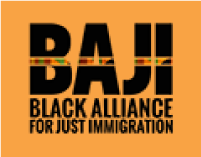Blog
Investigating Border Patrol’s Abuse of Power in the 2020 George Floyd Uprising
by Baele Hasbrouck
The Black Alliance for Just Immigration (BAJI) along with other immigrant rights organizations, including the American Immigration Council and the ACLU, are working on a pending lawsuit against Customs and Border Protection (CBP) to uncover the government’s role in domestic policing and disrupting the 2020 uprisings that erupted across the US following the murder of George Floyd by Minneapolis police.
We have received thousands of pages of documents which we must review before further litigation for more responsive information to further our understanding of the CBP’s participation and impact on law enforcement efforts to suppress BLM protests.
Documents released by CBP show more black pages than white. Redactions upon redactions of pertinent information essential to our constitutional rights which the agency is referring to as “exempted information”. According to CBP’s Freedom of Information Act (FOIA) page, the agency will redact, or blackout any information protected from disclosure by one of the FOIA’s nine exemptions.
What we did learn though is almost just as important as what we didn’t. If nothing else, the FOIA reports support news stories about the widespread presence of CBP agents, and the heightened civil unrest, detentions, and interviews of protesters generated by these agents.
Federal agents, including the elite Border Patrol Tactical Unit (BORTAC), the Special reaction team (SRT), and the Rapid Deployment Teams (RDT) were deployed across US cities as part of the Biden administration’s “Protecting American Monuments, Memorials, and Statues” order which was created in reaction to the growing public resistance against the preservation of racist landmarks that uphold the country’s enduring white supremacist legacy.
We have found that public testimonies and accounts from journalists and protesters on the ground can, at times, be more informative than CBP FOIA productions. In July 2020, the Guardian reported on the history of BORTAC and how the Trump administration deployed them into US cities.
As news circulated of demonstrators being shot in the face with “less lethal” munitions, and of unidentified masked agents in camouflage strong-arming civilians into unmarked vans, the nightmare scenario Tomsheck had heard expressed by his bosses almost a decade ago – of border patrol becoming a nationwide militarized force operating outside constitutional constraints – was becoming real. “Border patrol has always seen itself as a militarized force, and that aspiration is now being enabled by the current administration,” Tomsheck told the Guardian.
In this Washington Post article from July, 2020, protesters describe being kidnapped and snatched by militarized federal agents and being detained in unmarked vehicles. This New York Times article reports on the heightened surveillance in fifteen cities during the uprising. And in yet another article the Times reviewed reports from different cities that showed abuse and incompetence by local and federal law enforcement.
CBP is notorious for lacking accountability and restraint when it comes to use of force. For years, immigration advocates have documented abuses, coercive tactics, and violations of its authority. CBP’s FOIA productions correspond with the public documentation of government maltreatment of protesters, however, details of torture, presence of undercover officers and unlawful detentions are redacted.
The most cited reasons for the overwhelming amount of redactions are Exemptions 6 and 7(C). Under the FOIA, “privacy encompass[es] the individual’s control of information concerning his or her person.” Exemption 6 protects information about individuals in “personnel and medical files and similar files” when the disclosure of such information “would constitute a clearly unwarranted invasion of personal privacy.”3 Exemption 7(C), discussed below, is limited to information compiled for law enforcement purposes and protects personal information when disclosure “could reasonably be expected to constitute an unwarranted invasion of personal privacy.”
Overall, the FOIA productions have been underwhelming in providing new information about the role of federal officers in the George Floyd uprising – which is telling of the low standard of transparency and accountability that federal officers are held to. The deployment of immigration and military enforcement is unwarranted and should alarm us all.
Protests calling for increased accountability and an end to human rights violations of Black people at the hands of law officers should not be met with the presence of more federal law enforcement agencies with a history of abuse and misconduct.
Baele Hasbrouck is a third-year law student at the University of California, Irvine School of Law. Prior to law school, Baele graduated from Louisiana State University with a B.A. in Political Communication and double minors in Spanish and Psychology. Baele worked at BAJI as a legal intern on the BAJI Mexico project.
